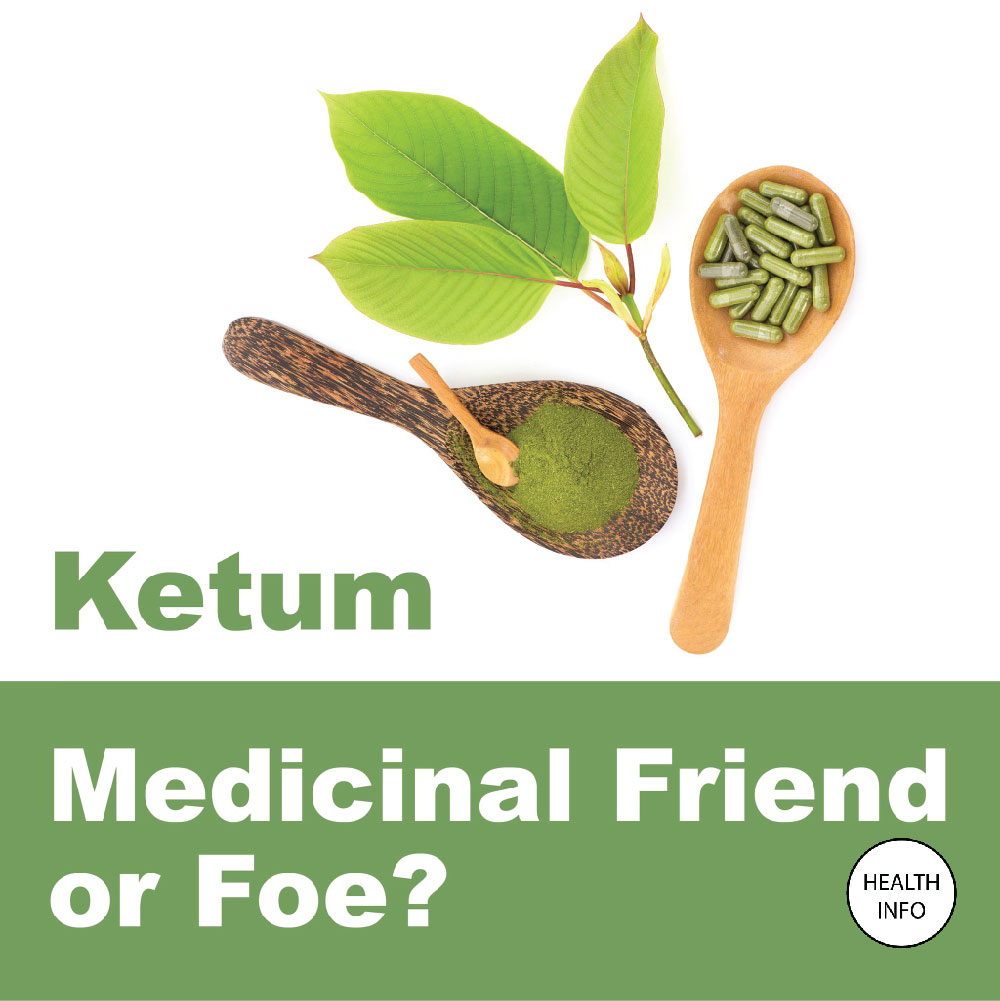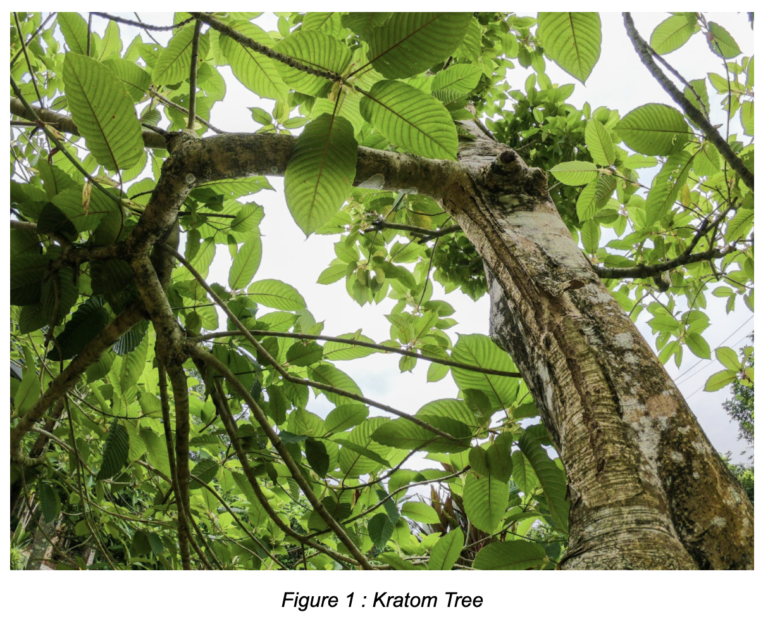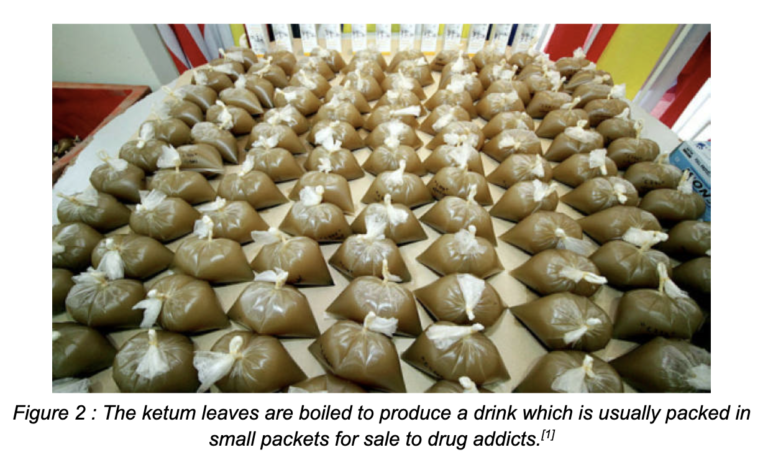- Home
- Health Center
- Health Info
- Ketum: Medicinal Friend or Foe?
Medicine Safety
Ketum: Medicinal Friend or Foe?


Unveiling Ketum
Mitrogyna speciosa, known internationally as “kratom” and locally as “Ketum”, is a tropical tree of the coffee family that is native to Southeast Asian countries. In Malaysia, they are found growing wild mainly in the northern states and the east coast of Semenanjung Malaysia [1]
Potential Health Benefits
Traditionally, Ketum leaves are used as a medicine for ailments such as back pain, fever, and cough. The water from the ketum leaves have also been used as traditional medicine for diabetes and hypertension. Laborers would ingest this leaf to combat fatigue caused by long working hours and improve work productivity.[2] However, the consensus remains that there is no evidence to indicate that kratom is safe or effective for any medical use.

Use and Abuse of Ketum
The Ketum leaf contains over 40 alkaloids, with Mitragynine being the main constituent accounting for over 66% of the total alkaloids [2,3]. Mitragynine and 7-hydroxymitragynine (7-HMG) are psychoactive alkaloids exclusive to this plant. The effects of Mitragynine on humans are dose-dependent.[3] At low doses, the leaves of the Ketum tree are a known stimulant. [4] At higher doses, ingesting the Ketum leaf has an analgesic and anti-inflammatory benefit as well as aiding in opioid withdrawal syndrome which arises from its opioid-like properties. Higher doses also cause euphoria, sedation and mind-altering effects akin to opioids.[3,5] One study even found it to be more potent than morphine, another opioid drug![7]
Red Alert!
Several reports show that Kratom use can also lead to respiratory depression, anorexia, depression, psychosis, and seizures. Similarly, there have been concerns about overdose-related deaths, risks of addiction, abuse, and dependence on Ketum.[7] Due to the nature of Mitragynine as a psychoactive ingredient and its potential for abuse, it is subjected to control in Malaysia under the Poisons Act 1952 [Act 366][4]
Registration Status in Malaysia and its Associated Controversy
Mitragynine is listed as a psychotropic substance under the Poisons Act 1952. Import, export, manufacture, sale and possession of mitragynine is listed as a criminal offense under Section 30 of this act for which the punishment is a fine of not more than RM10,000, 4 years imprisonment or both.[4]
However, kratom trees themselves are not illegal plants! As it stands, the cultivation or presence of naturally growing kratom is not prohibited by any law in Malaysia. This loophole blunts the teeth of law enforcement as they are not able to attack the production of kratom leaves. The lack of any test kits sets law enforcement back even further as they are unable to arrest and prosecute kratom addicts. Thus, the focus of the law is largely placed on the transporting, processing and selling of kratom.[8]
As it can be easily cultivated in Malaysia, further research into the use of kratom may give Malaysia an economic and academic advantage of its untapped medicinal potential. While we hope to move in that direction, Caring Pharmacy does not encourage use or misuse of kratom.
References:
- Abuse of ketum leaves. Ministry of Health Malaysia. (Web accessed February 2022). Web link: http://www.myhealth.gov.my/en/abuse-of-ketum-leaves/
- Mitragyna speciosa use in the northern states of Malaysia: A cross-sectional study. K Ahmad and A Aziz (2012). Journal of Ethnopharmacology.
- Following “the Roots” of Kratom (Mitragyna speciosa): The Evolution of an Enhancer from a Traditional Use to Increase Work and Productivity in Southeast Asia to a Recreational Psychoactive Drug in Western Countries. E Cinosi et al. (2015). BioMed Research International.
- Ketum Abuse in Malaysia: Its Legal Status and Proposed Solution. MS Mallow (2020). Perdana: International Journal of Academic Research.
- Statement from FDA Commissioner Scott Gottlieb, M.D., on the agency’s scientific evidence on the presence of opioid compounds in kratom, underscoring its potential for abuse. US Food and Drug Administration (FDA). (Web accessed February 2022). Web link: https://www.fda.gov/news-events/press-announcements/statement-fda-commissioner-scott-gottlieb-md-agencys-scientific-evidence-presence-opioid-compounds
- Pharmacology of kratom: an emerging botanical agent with stimulant, analgesic and opioid-like effects. WC Prozialeck, JK Jivan and SV Andurkar (2012). Journal of Osteopathic Medicines.
- Overview of herbal medicine and dietary supplements. UpToDate. (Web accessed February 2022)Web link: https://www.uptodate.com/contents/overview-of-herbal-medicine-and-dietary-supplements?search=kratom&source=search_result&selectedTitle=2~7&usage_type=default&display_rank=2#H37
- Enforcement Status of The Poison Act 1952 Against Offences Related to Kratom (Mitragyna Speciosa Korth) Misuse in Malaysia. SK Halim, R Ahmah and SAJ Abdullah (2020). UUM Journal of Legal Studies
Tags
Latest Health Info
Brave the Cold: Winter Travel Needs
Winter travel has its kind of magic — snow-covered landscapes, cozy lodges, hot drinks, and festive markets. But traveling in ...
Beat the Heat When Travelling
Whether you’re on a scenic beach vacation or exploring a busy city, hot weather can quickly wear you out and ...
Got Pins & Needles? Learning about Diabetic Neuropathy
Diabetic neuropathy is a common yet serious complication of diabetes, estimated to affect up to 50% of people with the ...



